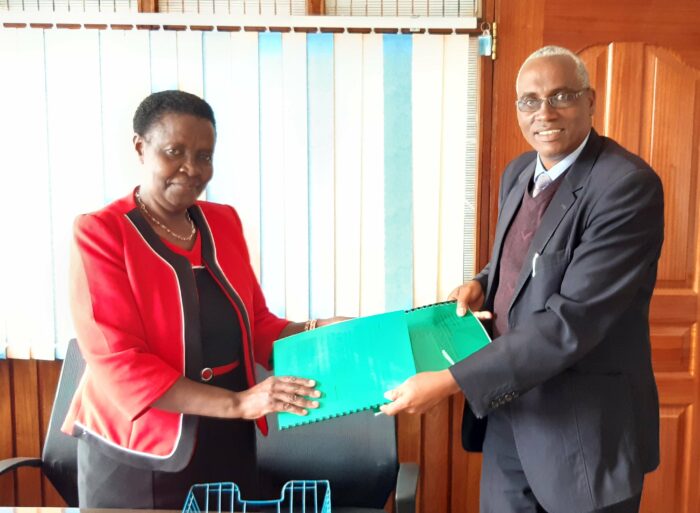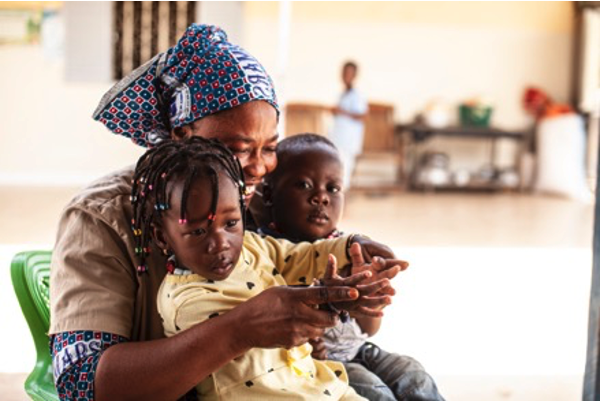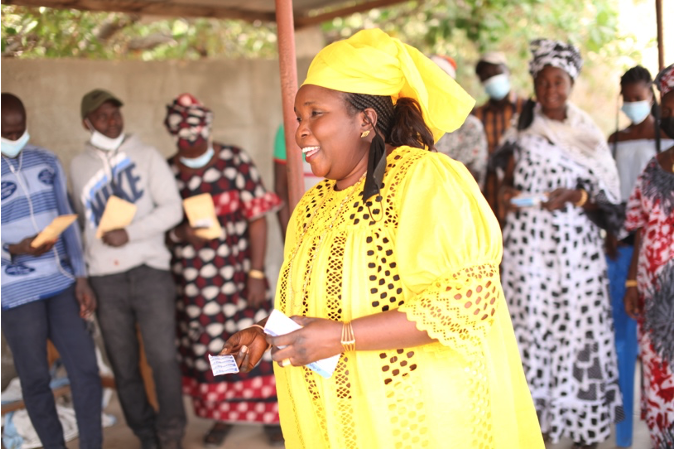During the month of March, the U.S. and the broader global community are coming together to celebrate the achievements of women. Tuesday, March 8, marked International Women’s Day, where we imagine a gender equal world, a world free of bias, stereotypes, and discrimination. That’s the goal of this year’s theme to “#BreaktheBias,” and the U.S. will celebrate the historical contributions of women throughout the month.
As a reflection on this emphasis month, NCBA CLUSA recognizes the critical importance of addressing gender dynamics in its work to empower individuals and families to achieve resilience and economic security and exercise a better, longer and healthier quality of life across the globe. NCBA CLUSA’s approach to international development emphasizes that its clients are the decision-makers when it comes to solving their communities’ most pressing development needs. This community-led approach highlights the importance of collective action, shared values, and a focus on process. NCBA CLUSA also applies this approach to its work in gender integration and the way it addresses gender in its three practice areas. While all of our projects integrate gender equity and women’s empowerment, keep reading to learn about a few of our current projects that highlight this work.
In celebration of International Women’s Day, NCBA CLUSA spotlights the gender work of the Creating an Environment for Cooperative Expansion (CECE) Project

In honor of International Women’s Day, NCBA CLUSA celebrates women cooperative leaders around the world and highlights the gender work of our Creating an Environment for Cooperative Expansion (CECE) project, funded by the US Agency for International Development (USAID) Cooperative Development Program (CDP).
The CECE project provides technical assistance to over 60 cooperatives and cooperative unions in Kenya, Tanzania, Madagascar, Peru, and Guatemala through tailored coaching, trainings, learning exchanges, and other activities. A key component of this work is ensuring that women are included in cooperative activities and governance, empowered to take on leadership roles, and valued for their contributions.
The CECE project conducted a gender analysis that was highlighted as part of NCBA CLUSA’s 2021 International Women’s Day celebrations. Since then, the CECE project has continued and embarked on new activities to promote gender equity in cooperatives.
NCBA CLUSA supports incarcerated women’s chocolate business in Quillabamba, Peru to take steps toward becoming a cooperative
 “We are mothers, we are daughters, and we are human beings” proclaimed Roxana, a proud member of the Dulce Esperanza chocolate producing women’s group in Quillabamba, Peru. Roxana is also an inmate at the women’s penitentiary of Quillabamba serving a 10-year sentence. In fact, all 40 members of Dulce Esperanza are prisoners at the women’s penitentiary. Most of these women come from poor communities and committed the crime of transporting cocaine from the countryside to the city—some unknowingly—and in general, in exchange for very little money. Many of them are now serving over 10-year sentences for their crimes. The women’s penitentiary in Quillabamba supported the inmates in starting the Dulce Esperanza group to produce chocolate and make handicrafts to generate income for their children while they are incarcerated. The women of Dulce Esperanza group have great potential to professionalize and expand their business but needed additional training, and this is where NCBA CLUSA’s Creating an Environment for Cooperative Expansion (CECE) project came in.
“We are mothers, we are daughters, and we are human beings” proclaimed Roxana, a proud member of the Dulce Esperanza chocolate producing women’s group in Quillabamba, Peru. Roxana is also an inmate at the women’s penitentiary of Quillabamba serving a 10-year sentence. In fact, all 40 members of Dulce Esperanza are prisoners at the women’s penitentiary. Most of these women come from poor communities and committed the crime of transporting cocaine from the countryside to the city—some unknowingly—and in general, in exchange for very little money. Many of them are now serving over 10-year sentences for their crimes. The women’s penitentiary in Quillabamba supported the inmates in starting the Dulce Esperanza group to produce chocolate and make handicrafts to generate income for their children while they are incarcerated. The women of Dulce Esperanza group have great potential to professionalize and expand their business but needed additional training, and this is where NCBA CLUSA’s Creating an Environment for Cooperative Expansion (CECE) project came in.
NCBA CLUSA helps indigenous women’s recycling groups start their own cooperative in Guatemala

Lake Atitlán in Guatemala is known as one of the most beautiful lakes in the world. Located in the southwestern highlands in the department of Solola, this vast, volcanic lake is less than 3 hours from Guatemala City. As home to the Mayan cultures of the Tz ‘utujil, K’iche’ and Kaqchikel, the Lake Atitlán basin is also rich in history and culture. Over the past decade, however, this majestic landmark has become increasingly threatened by pollution.
In 2017, the Association of Friends of Lake Atitlán (AALA) began working with several groups of indigenous women living around the Lake Atitlán basin to promote effective management of recycling activities and reduce lake pollution, while also promoting women’s economic development. Over the past few years, these recycling groups have grown to 28 groups representing 965 women. Their initiative has been supported by other organizations as well, including the Central American Bottling Corporation, the Centre for International Studies and Cooperation in Canada, Social Capital Foundation (SCF), and Roots for Sustainability (R4S).
NCBA CLUSA supports Capital SACCO in Kenya to launch a new program promoting financial inclusion

In Swahili, “casa dada” means “empower a woman.” It’s also the name of a new, innovative program being offered by Capital SACCO (credit union) in Meru County, Kenya to promote financial inclusion. Specifically, CASA DADA is a financial literacy training and savings and loan program for women. To encourage more women to save at the SACCO and improve their financial literacy and ability to access credit, Capital SACCO launched the CASA DADA program in May 2021.
NCBA CLUSA works with Capital SACCO through its Creating an Environment for Cooperative Expansion (CECE) project, which is part of the U.S. Agency for International Development (USAID)-funded Cooperative Development Program (CDP). Originally, Capital SACCO was included in CECE’s cooperative coaching program, but the relationship soon expanded. Through the Social Systems Network Analysis conducted by CDP partners Global Communities, World Council of Credit Unions and NCBA CLUSA with support from Root Change in 2019-2020, Capital SACCO was recognized as a “resource hub” in Meru County by fellow cooperative stakeholders. In addition to coaching activities focusing on governance and other cooperative management topics, NCBA CLUSA realized Capital SACCO could grow into a more effective and inclusive resource hub for the cooperative community in Meru County.
The Kawolor Project puts decision-making power in the hands of local women
 The Feed the Future Senegal Kawolor project places women at the heart of nutrition and food security interventions in Senegal. Women play an important role in agriculture and in food production, representing 43% of the agricultural workforce, on average. However, they are more affected than men by hunger. Women are economically and socially disadvantaged because men still make many domestic and community decisions. They also have poor access to land, material, and financial resources. Aware of the central role of women in the overall management of the household, the Kawolor project implements various initiatives to remove obstacles that may hinder women’s participation. These initiatives encourage women’s voices in decision-making, particularly in improving nutrition and food security within families. Within the framework of the project’s gender component, two strategies for promoting good gender practices have been put forward.
The Feed the Future Senegal Kawolor project places women at the heart of nutrition and food security interventions in Senegal. Women play an important role in agriculture and in food production, representing 43% of the agricultural workforce, on average. However, they are more affected than men by hunger. Women are economically and socially disadvantaged because men still make many domestic and community decisions. They also have poor access to land, material, and financial resources. Aware of the central role of women in the overall management of the household, the Kawolor project implements various initiatives to remove obstacles that may hinder women’s participation. These initiatives encourage women’s voices in decision-making, particularly in improving nutrition and food security within families. Within the framework of the project’s gender component, two strategies for promoting good gender practices have been put forward.
In Senegal, women champion the flour processing industry

In the food processing business, women are generally the ones to ensure their families are fed at the household level, then sell the surplus production to meet their financial needs.
In Senegal, the women members of the Sainte Marthe Economic Group are the primary breadwinners for their families. Sainte Marthe buys the Obatanpa maize from Vélingara producers in the Kolda region of Senegal to process it and encourage consumption through sales. Created in 2018, the Sainte Marthe group produces high-quality flour. Their high quality nutritional products are used by projects, programs, non-governmental organizations, and other organizations that fight malnutrition in the region.
The women of GIE Sainte Marthe are participants in the Feed the Future Senegal Kawolor activity implemented by NCBA CLUSA and funded by USAID|Senegal as part of its contribution to the Senegalese Government’s strategy in the fight malnutrition, food insecurity and poverty. This project aims to curb malnutrition by empowering organizations and regional resources partners to scale up the Nutrition Led Agriculture (NLA) approach and utilize market opportunities for sustainability.
Mimi Diedhiou, a role model for her community in Senegal

Mimi Diedhiou, better known as Mrs. Diedhiou, is an English-language teacher at Kounkané’s junior high school in the Kolda region of Senegal. “Mrs. Diedhiou is a model of leadership for us. In addition to being kind and determined, I love the way she talks,” says Thaïs Manga, one of her 8th grade students. Her colleague Mr. Sonko, history and geography teacher, added that Mrs. Diedhiou is a role model for all women in the Kolda region.
Mimi, Mr. Sonko and four other professors were chosen out of 16 in their college to teach courses in Improvement of Work Performance and Entrepreneurship in Senegal (APTE), a discipline reserved for the 90 best students out of 750 students in the junior high school designed to inspire entrepreneurship beyond their studies.
In addition to being an English-language teacher, Mimi is also the treasurer of GIE Sainte Marthe, which specialises in the processing of cereals into flour made from Obatanpa maize, millet, cowpea, palm oil, moringa and peanut butter, along with 29 other women aged between 28 and 57.
Help women entrepreneurs in Haiti build economic power
 Only about 20 percent of startups globally are women-led. Because inequality does not have to remain the status quo, NCBA CLUSA is joining the Cooperative Development Foundation (CDF) to launch the International Women-led Enterprise Fund. As change agents, we aim to break barriers, promote equal opportunity and upward mobility to maximize the potential of women and their communities. Our first pilot will benefit the Women’s Advocacy Network of Ouanaminthe (Rassemblement des Femmes Engagées de Ouanaminthe / RFEO), a Haitian small business and social enterprise with 300 women members.
Only about 20 percent of startups globally are women-led. Because inequality does not have to remain the status quo, NCBA CLUSA is joining the Cooperative Development Foundation (CDF) to launch the International Women-led Enterprise Fund. As change agents, we aim to break barriers, promote equal opportunity and upward mobility to maximize the potential of women and their communities. Our first pilot will benefit the Women’s Advocacy Network of Ouanaminthe (Rassemblement des Femmes Engagées de Ouanaminthe / RFEO), a Haitian small business and social enterprise with 300 women members.
RFEO advocates for women’s rights and creates economic growth opportunities for women. RFEO gives women entrepreneurs access to affordable credit to support their businesses and to help them during family emergencies.
The Honorable Kany Ndiaye, a woman with seven hats

Kany Ndiaye has been dubbed “honorable” by her collaborators and close friends in the Senegalese village of Keur Aliou Diop. She is a wife and mother, an entrepreneur and role model, and is active in improving her living conditions and those of the women in her village—all of whom hold her in high regard.
They are both affiliated with the CultiVert Social Franchise, an entity dedicated to enhancing the professionalism of franchisees whose primary mission is to provide solutions for healthy and prosperous communities through improved accessibility to food security products, services and information. Both are participants in the Feed the Future Senegal Kawolor activity implemented by NCBA CLUSA and funded by USAID|Senegal as part of its contribution to the Senegalese Government’s strategy in the fight malnutrition, food insecurity and poverty. This project aims to curb malnutrition by empowering organizations and regional resources partners to scale up the Nutrition Led Agriculture (NLA) approach and utilize market opportunities for sustainability.


